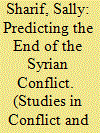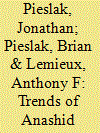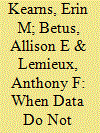|
|
|
Sort Order |
|
|
|
Items / Page
|
|
|
|
|
|
|
| Srl | Item |
| 1 |
ID:
178676


|
|
|
|
|
| Summary/Abstract |
The innovation terrorist groups apply to their strategy and tactical operations is subject to increasing study. Yet an assessment of the innovation applied by terrorist groups to their financing is lacking, with consideration typically limited to “where does the money come from and what is it used for?” The forces that determine how terrorist groups fund themselves are questioned less closely. Given the widely held belief by national governments and international organizations that financing is a key requisite of terrorist activity, this omission represents a striking gap in our ability to anticipate, disrupt, and deny terrorists of financing.
|
|
|
|
|
|
|
|
|
|
|
|
|
|
|
|
| 2 |
ID:
178678


|
|
|
|
|
| Summary/Abstract |
This article examines how and when energy is used as a punitive or rewarding measure to advance foreign policy ends under conditions of perpetual conflict. Drawing on hundreds of primary governmental and commercial documents, and extensive elite interviews, we examine Israeli–Palestinian relations over 50 years. We find extensive instrumentalization of energy for foreign policy objectives in the conflict. We highlight electricity, a neglected area in international relations and conflict literatures, as a significant foreign policy tool. Our findings emphasize four major variables that shape the timing and form of energy measures—politics, regime type, dependence level, and energy production chain.
|
|
|
|
|
|
|
|
|
|
|
|
|
|
|
|
| 3 |
ID:
178679


|
|
|
|
|
| Summary/Abstract |
During the 1980s, the United States spent substantial political and economic capital supporting the Nicaraguan Contras. How effective was this in helping the rebels take on the Sandinista government? This article explores this topic by extending the application of principal-agent theory. It finds that, as expected, the effect of U.S. assistance was undermined by adverse selection and agency losses. However, the most important factor that undermined support effectiveness was the great inconsistency of the level of U.S. aid awarded to the insurgents. Reductions of official U.S. government support led to insurgency campaign collapse and meant that, in the end, the U.S. support program was only partially effective in helping the Contra struggle.
|
|
|
|
|
|
|
|
|
|
|
|
|
|
|
|
| 4 |
ID:
178674


|
|
|
|
|
| Summary/Abstract |
We explore the relationship between coalitional alignment and memories of the Croatian Homeland War. Fifty-seven Croatian citizens with war experiences participated in a semi-structured interview. Participants less affected by the war and high in ethnic commitment recalled more morally charged memories than participants low in commitment. Participants highly affected by the war similarly recalled morally charged memories; however, the qualitative nature of the memories differed between high and low commitment. Offspring of mixed marriages and Orthodox participants reported more virtuous behaviors than other participants. The findings contribute to the literature on the intractability of conflict.
|
|
|
|
|
|
|
|
|
|
|
|
|
|
|
|
| 5 |
ID:
178672


|
|
|
|
|
| Summary/Abstract |
The current study examines mass public shooters who target government agents and institutions in the United States. This research uses a rational choice perspective to examine the incidence, motivations, and target selection. Additionally, this work provides an in-depth investigation of ideological attacks, as well as a comparison against general mass public shooting perpetrator, planning, and incident characteristics. Results indicate non-ideological attacks against government targets occur more than ideologically motivated shootings. Importantly, the majority of ideologically motivated mass public shooters do not attack government targets. These findings provide implications for security, policy, and prevention strategies that have historically focused on ideologically motivated mass public shootings against government targets.
|
|
|
|
|
|
|
|
|
|
|
|
|
|
|
|
| 6 |
ID:
178667


|
|
|
|
|
| Summary/Abstract |
The Syrian civil war has confounded all predictions on its end date and is still ongoing. Valuable explicative work has been done on civil war duration; however, scholars have failed to reliably predict the end of ongoing conflicts. This article argues that faulty predictions on termination date of the Syrian conflict did not necessarily result from statistical errors in modeling civil wars data and better models might not necessarily mitigate the prediction problem. Rather, three factors contributed to the misperceptions: the conflict’s cartography problem, the splintering of the opposition, and the multi-partner foreign intervention in the conflict. The last two factors can also be held accountable for prolonging the conflict. Incorrect predictions or descriptions in scholarly works on ongoing conflicts can have disastrous implications for the present and future of states and populations beset by protracted conflict. Had it been made clear that neither the insurgents nor the government had the capacity to win the war within the predicted timeframe, the international community may have taken a more decisive role in bringing belligerents to the negotiation table, improving prospects for a peaceful diplomatic settlement.
|
|
|
|
|
|
|
|
|
|
|
|
|
|
|
|
| 7 |
ID:
178669


|
|
|
|
|
| Summary/Abstract |
The rapid growth in research directed toward preventing violent extremism has resulted in a rich but fragmented body of literature spanning multiple disciplines. This review finds a number of themes that cut across a range of disciplinary approaches and suggests that the concept of resilience could provide the basis for a common framework for prevention. However, thus far the notion of resilience to extremism has often focused on the individual, and insufficient attention has been given to the role of contextual structures and institutions. We suggest that a social–ecological perspective on resilience could re-orientate the discourse on resilience to extremism.
|
|
|
|
|
|
|
|
|
|
|
|
|
|
|
|
| 8 |
ID:
178673


|
|
|
|
|
| Summary/Abstract |
This article examines the sociopolitical factors that influenced the framing of counterterrorism measures (CTMs) in Nigeria. It argues that the government strategically excluded civil society organizations CSOs from participating in the process of formulating CTMs. Thus, this situation renders CSOs without agency in the making of CTMs and their legal capacity to advocate for the marginalized and vulnerable groups in the context of counterterrorism in Nigeria. Additionally, the employed strategic exclusion of CSOs aided in the construction of a service delivery role that restrained political advocacy. Furthermore, the study argues that, despite the government counterterrorism approach, CSOs did not seek public support on the need to contest CTMs in Nigeria and have complied with these laws and policies. The empirical analysis is based on mixed-method research of CSOs and government agents. This research seeks to contribute to the debate regarding the effects of CTMs on CSOs by tracing the establishment of service delivery roles for CSOs to these organisations strategic exclusion in the formulation of CTMs.
|
|
|
|
|
|
|
|
|
|
|
|
|
|
|
|
| 9 |
ID:
178677


|
|
|
|
|
| Summary/Abstract |
Readjusting to society after a prolonged period of detention is fraught with emotional and practical challenges. When recently released prisoners convicted of terrorism offenses focus on rebuilding their lives, supporting their families, and engaging with community members they may be less likely to resume the subversive behavior that put them behind bars. With this in mind, the Indonesian government attempts to facilitate the reintegration of former extremist inmates, primarily through entrepreneurial development initiatives. The government’s general approach holds promise but suffers from insufficient planning and human resource constraints. Greater involvement from local authorities and civil society would provide opportunities for more consistent engagement and a stronger chance of successful reintegration outcomes.
|
|
|
|
|
|
|
|
|
|
|
|
|
|
|
|
| 10 |
ID:
178665


|
|
|
|
|
| Summary/Abstract |
This article examines how Da‘esh utilizes anashid (“Islamic songs” or “recitation”) as soundtrack elements within its video messaging, focusing primarily on a sample set of 755 videos released in 2015. The authors also present the development of an automatic content recognition (ACR) tool that enabled them to engage this large data set. The article then explores the possibilities of ACR for the identification of terrorist audio and video, utilizing the conclusions drawn from the trends of audio usage in Da‘esh video messaging to support the validity and promise of such an approach.
|
|
|
|
|
|
|
|
|
|
|
|
|
|
|
|
| 11 |
ID:
178670


|
|
|
|
|
| Summary/Abstract |
Images are known to have important effects on human perception and persuasion. Jihadist groups are also known to make strategic use of emotive imagery and symbolism for persuasive ends. Yet until recently studies of the online magazines published by violent jihadist groups largely focused on their textual, not their image, content and, while the image content of these magazines is now the subject of a burgeoning number of studies, few of these compare the images used by different groups. This article accordingly offers a cross-group comparison, examining the image content of a total of thirty-nine issues of five online magazines published by four different jihadist groups. Starting with a content analysis, it shows that the images’ most common focus is non-leader jihadis. Using a news values analysis, it then shows how these images of non-leader jihadis are used to visually construct the identity of a “good Muslim.” This construct is characterized by three traits, each corresponding to a different news value: fulfilled (personalization); active (consonance); and respected (prominence). Moreover, these traits are intertwined: fulfillment comes from responding actively to the call to violent jihad, which in turn promises respect. The article concludes by highlighting some subtle differences between how the news values of personalization, consonance, and prominence are realized in the different magazines, and by discussing the implications of the “good Muslim” construct for efforts to develop countermessages.
|
|
|
|
|
|
|
|
|
|
|
|
|
|
|
|
| 12 |
ID:
178663


|
|
|
|
|
| Summary/Abstract |
Public perceptions of terrorism are out of line with reality. How can perceptions be changed? Using a 4 × 2 experimental design with a national sample of U.S. adults, we examine how source of information and details provided impact views of terrorism. Sources, details, and individual-level factors—Islamophobia, trust in media, and trust in science—impact perceived accuracy of terrorism data. Many people updated their views on terrorism after reading factual information, yet only trust in science was related with this change. In short, people can be persuaded by factual information on terrorism, but it is less clear why they change beliefs.
|
|
|
|
|
|
|
|
|
|
|
|
|
|
|
|
|
|
|
|
|